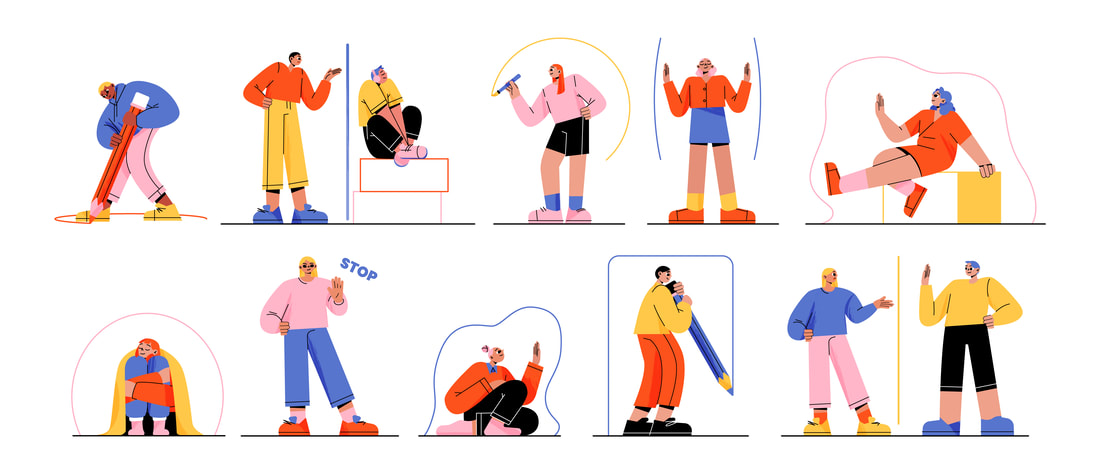|
Feature by Simran Bharadwaj Image via Freepik Do you find yourself rolling your eyes every time your partner corrects you? Maybe you feel like you’re doing everything wrong because your partner is always nagging you throughout the day. Have you asked your partner to do something so many times with no results that you just give up?
0 Comments
Feature by Nikita Fernandes Autism spectrum is a neurological developmental difference in the brain. People with autism are characterized as authentic, sensitive, and independent thinkers who might struggle with social convention. People with autism fall under a neurodivergent umbrella along with ADHD. The exact cause of autism is still unknown and theories credit a mixture of genetics and environmental factors. People that are born with autism are diagnosed by professionals using their behavioral & developmental history. Writer and autism activist Suzannah Weiss presented a lecture on "Sex On The Spectrum: Navigating Relationships, Dating, And Sexuality With Autism" through the Modern Sex Therapy Institute and shared that people are impacted by autism to varying degrees and every person with autism is different. Thus, the way that autistic people navigate interpersonal relationships is not a one size fits all model. People with autism might also try to navigate interpersonal relationships by attempting to mask. Austistic masking refers to hiding ones autistic traits in order to fit in. However, this can lead to autistic burnout in which they experience exhaustion of trying to fit in with neurotypical individuals.
Feature by Simran Bharadwaj Image via Freepik LGBTQ+ youth have challenges but despite the stigma and stereotypes, they are often resilient. The courage and self-awareness that they have to live as their authentic selves. In this heteronormative world, it is difficult to express your own unique identity without harassment from others. It is important for others to recognize the struggles that LGBTQ+ youth face and learn how to be better allies.
Feature by Simran Bharadwaj Image via Freepik I just want some alone time!! Is it bad that I don't want to spend 24/7 with my partner?
Sound familiar? If you want space in a relationship, or if your partner wants space, it is easy to panic and catastrophize. Do they still love me? Am I annoying them? Are they annoyed with me? Are they going to leave me? The questions come flooding in, however it is useful to remember that some space in relationships is actually healthy. Giving space to your partner and taking some space for yourself can grow and recharge the relationship, maybe even allowing you to become closer over time. Feature by Nikita Fernandes What comes to your mind when you think about intersectionality? Intersectionality is a term that was coined in 1989 by Kimberly Crenshaw, who is a social justice advocate in America. Crenshaw coined the terms to denote of the intersections of people's identity which might contribute to their unique world view. For example, two black individuals might have different life experiences if one of them was queer and one of them was straight. Intersectionality also speaks to the multiple points of disadvantages or inequality that someone might experience due to holding multiple minority identities. The identities that people hold might include gender, race, ethnicity, sexual orientation, gender identity, disability, class. For example, someone that is a person of color might also be from a lower economic class and be disabled which presents multiple barriers for them to navigate.
Feature by Simran Bharadwaj Image via Freepik Being a psychotherapist can be an isolating experience at times. You spend hours each day listening to and helping others be the best version of themselves. Being a psychotherapist, you help others on their journey to optimal living. However that does not mean psychotherapists are perfect. We do not always have our life together. We are not always perfect. We are not always the best at communication.
 "Curiosity is the answer"; It is a funny phrase, doesn't curiosity mean asking questions? When I first started practicing as a clinician, and my clients, or potential clients would ask me "how does psychotherapy work?" "how will I know if I am benefitting from psychotherapy?" "will I have to be in therapy forever?" I always tried to have sophisticated answers. I knew, these question were going to be asked at least once a week, so I prepared. I practiced my elevator pitch, fine tuned it, perfected it. When the moment arose, and the questions were asked, I was fully prepared to "sell therapy." As I became a more seasoned clinician, and I retired from being the sales rep for psychotherapy, and got tired of convincing others about why they should see a psychotherapist (I know, I know, we have all been there) the answer to all these questions came to me in one word. Curiosity. That's all. Simple as that. The client and the therapist, together, actively practicing curiosity. I am not negating the importance of theory, training, education, and having a conceptual framework of a client's presenting issue. However, at the forefront, curiosity should lead the way.
Curiosity is key. The most essential ingredient in the therapy room is the freedom to "get curious" and to ask questions. With that in mind, today if you asked me, here are my answers to the common questions asked about psychotherapy. Feature by Nikita Fernandes In his book titled "The Body Keeps the Score," trauma expert Bessel Van Der Kolk writes that our nervous system, and by extension our bodies, are changed after we experience trauma. He speaks to an internal shift that happens within an individual after experiencing a trauma such as sexual trauma. Sexual trauma is exposure to unwanted sexual behavior that leaves the individual feeling violated. RAINN says that every 68 seconds, someone in America is assaulted. Sexual trauma symptoms include feeling depressed, lonely, disconnected from their bodies and so on. It also has a large impact on peoples sexual lives after the trauma.
Some people in society are at a higher risk for trauma such as people that are gender non-conforming. People that identify as trans or non-binary can often be fetishized and made to feel unsafe at the same time. Other individuals, such as people socialized as men, have a harder time acknowledging and processing trauma due to the stigma of toxic masculinity. People socialized as men might be more hesitant to speak about trauma for fear of not being believed as well. It is important to acknowledge the intersecting identities that people hold while experiencing trauma. Thus, the issue of sexual violence is a systemic one and while we cannot fully control what happens to us, we can empower ourselves with coping tools. If someone is working through sexual trauma, it can be helpful to: Feature by Simran Bharadwaj Image via Freepik Communication is the basis to healthy relationships. We may often think we are being clear with our partners or friends, yet will get into arguments repeatedly, sometimes about the same things. Healthy and clear communication can help share thoughts and views with a partner, resolve misunderstandings and settle arguments. There are methods that you can use outside of the therapy room to continue practicing healthy communication habits starting with the active constructive responding model.
Feature by Simran Bharadwaj Image via Freepik The new year tends to be all about forgiving and starting fresh, letting things go to be on better terms with friends or family members. As a result, there may feel like there is pressure to do so despite the trauma that some individuals may have caused. However, forgiving does not mean forgetting what someone has done and allowing them to keep pushing your boundaries. You can forgive someone and still:
Forgiving a person can be therapeutic and healing for you despite the trauma that they have caused. It allows for you to understand the impact this individual had on your life and why you need to maintain your boundaries with them. It can help develop healthy relationships in the future because you are more attentive to your needs within a relationship. Forgiveness can lead to inner peace which can positively impact physiological wellness and can offer protection against upsetting relationships in the future. It definitely is not easy to forgive someone who you know has wronged you, however there are five skills that can help with finding the right balance between forgiving and maintaining your healthy boundaries. Skills for Forgiveness: 1. Acceptance Acceptance does not mean accepting defeat. It means understanding and accepting the situation at hand. This allows for you to alter your view about a situation and accept that there is nothing you can change about the past while being able to maintain healthy boundaries in the present 2. Emotional Regulation It is important to recognize the emotions that you are feeling rather than suppressing them within. This will help to manage your emotions rather than allowing them to take over your body. 3. Shifting Perspectives Mindfulness practices can assist in standing back and observing your thoughts and feelings. This awareness of what you are feeling can allow for your mind and body to create a shift in the way you think about a situation. 4. Empathy and Compassion Empathy allows you to understand another’s emotions. Understanding how the other might be thinking and feeling can be helpful towards a path of forgiveness. 5. Radical Responsibility Responsibility requires you to be accountable for your actions, thoughts and feelings. This can mean admitting to your own mistakes in a situation. Recognizing unhealthy behaviors can help prevent you from repeating them. Regaining control of how you act and react to given situations can help allow you to see the benefits of forgiving others while maintaining the boundaries that you need in order to have meaningful relationships. These techniques can be used with friends as well as family members. Individuals often feel that they are required to forgive family because there is “no bond greater than blood,” however maintaining boundaries is a healthy aspect of being able to forgive someone and let go of the anger and resentment you may have. AuthorSimran Bharadwaj is a pre-professional licensed mental health therapist in New York City. You can contact Simran at simran@mwr.nyc and read more blog posts at www.mwr.nyc.
|
Authors
Archives
February 2023
Categories
All
|









 RSS Feed
RSS Feed